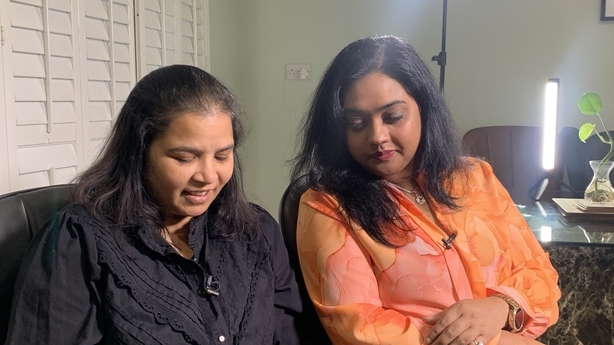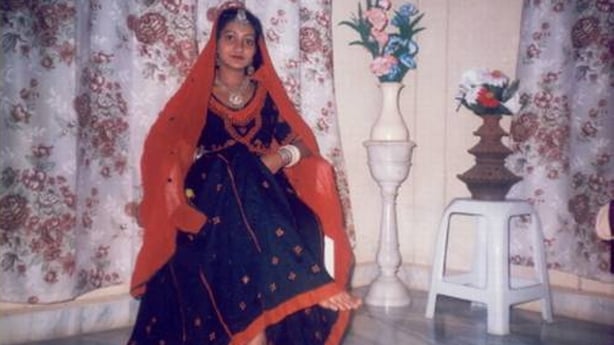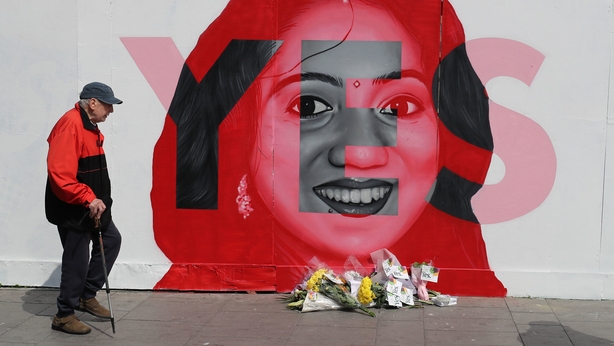It's the image we’re most familiar with. A photograph burned into the nation’s psyche.
A picture of a migrant, who was on the cusp of a new adventure in life, thousands of miles away from her homeland.
A person with a broad smile and bright eyes. Someone who her friends say lit up every room she walked into.
As some of those friends gathered to remember Savita Halappanavar this week, they scrolled through on-screen albums, image after image hinting at that promised future.

And despite the pain of their loss, as well as their cognisance of the impact it had on Irish society, those who make up the tight-knit Indian community in Galway return, time and again, to one thing above all else. Her smile.
Savita case led to changes in medical practice
Savita Halappanavar was 17 weeks pregnant with her first child when she presented with complications at University Hospital Galway on Sunday 21 October 2012.
Accompanied by her husband, Praveen, she knew something was wrong.
She was admitted to hospital and by the following morning her fears were confirmed.
While a foetal heartbeat was detected, doctors determined that the pregnancy was not viable.
The couple were informed and consoled, and advised that the coming hours would see nature take its course. It didn’t turn out like that though.
At the subsequent inquest into his wife’s death, Praveen Halappanavar said she could not take the pain of looking at her baby on an ultrasound monitor, after being told she was having a miscarriage.
He recalled her saying "how can a mother wait for her baby to die?", as she made the first of three requests for a termination to be carried out.

At one stage over the following day and a half, a midwife manager told the 31-year-old that such a procedure could not be undertaken because Ireland was a "Catholic country".
Ann Maria Burke later told the inquest that she regretted making the remark and explained that she used the reference to religion after Mrs Halappanavar "had mentioned the Hindu faith and that in India a termination would be possible".
Savita Halappanavar’s condition worsened considerably in the early hours of Wednesday 24 October, with one midwife saying she never saw a patient get "so sick, so quick" over a two-and-a-quarter-hour period.
With clear indicators of severe sepsis present, it was only at that stage that the law would have permitted doctors to carry out a termination.
But by then, it was too late. Mrs Halappanavar became more and more unwell. She died on 28 October.
Her inquest heard the cause of death was septic shock, E. coli in her bloodstream and miscarriage at 17 weeks.
In the months that followed, there were three official inquiries carried out.
Firstly the Coroner’s Inquest. It uncovered evidence of a systems failure at UHG; incomplete record keeping and several lapses in the standards of care provided.
A 257-page report by the Health Information and Quality Authority detailed a failure to provide even the most basic elements of care and said there were many missed opportunities that could have changed the outcome for Savita Halappanavar.
The third investigation carried out for the HSE, found inadequate assessment and monitoring of the patient, as well as a failure to recognise the increasing risks as they unfolded.
In total, 33 recommendations were made on foot of the analyses conducted.

The actions of all staff who treated Savita Halappanavar were reviewed. Nine were disciplined. None were dismissed or suspended.
Legal proceedings taken by Praveen Halappanavar were settled out of court in 2016, bringing an end to the official processes following his wife’s death.
But the reverberations of what happened on that week ten years ago still resonate.
They contributed to a renewed debate on Ireland’s abortion laws and framed the thoughts of many voters in the 2018 referendum that saw the Constitutional ban repealed.
Mrudula Vasepalli visited her friend Savita in hospital on a number of occasions a decade ago.
This week, she remembered how the loss of "someone who was like a sister" haunted her in the years that followed: "All I can say is it shouldn’t have happened. She should have lived and she would have enjoyed her life, she had so much to give."
Those sentiments are shared by another friend, Moshumi Mandal: "I always used to look at her and think ’how can a person be so happy, all the time?’ That’s Savita… I can still see her smile and there’s no Diwali that we don’t remember her at. She’s always there with us."
We need your consent to load this rte-player contentWe use rte-player to manage extra content that can set cookies on your device and collect data about your activity. Please review their details and accept them to load the content.Manage Preferences
And as they think back to the time immediately after the shock of what happened kicked in, Ms Vasepalli, recalls one of the final acts she had to carry out on her friends’ behalf: "On the day Praveen left with her body to India, we had to vacate the house and we went to pack her clothes for charity. Piles and piles of bags.
"All her dreams, all her wishes, packed away".
Both are grateful for the changes that came about in the years after their friend died.
But above all else, they miss her and her enthusiasm for life. Her joyful spirit, her captivating smile.







